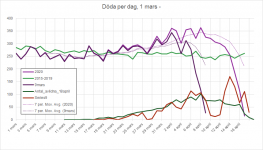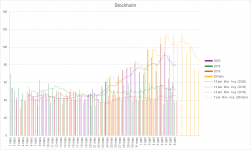Ardern’s style would be interesting—a world leader in comfy clothes just casually chatting with millions of people!—and nothing more, if it wasn’t for the fact that her approach has been paired with policies that have produced real, world-leading results.
Since March, New Zealand has been unique in staking out a national goal of not just flattening the curve of coronavirus cases, as most other countries have aimed to do, but eliminating the virus altogether. And it is on track to do it. COVID-19 testing is widespread. The health system has not been overloaded. New cases peaked in early April. Twelve people have died as of this writing, out of a population of nearly 5 million.
As a collection of relatively isolated islands at the bottom of the South Pacific, New Zealand was in a favorable position to snuff out the virus. “Because we had very few cases wash up here, we could actually” work toward an elimination strategy, Clark said. “It is undoubtedly an advantage to be sitting down on the periphery [of the world], because you have a chance to see what’s circulating from abroad.”
But Ardern’s government also took decisive action right away. New Zealand imposed a national lockdown much earlier in its outbreak than other countries did in theirs, and banned travelers from China in early February, before New Zealand had registered a single case of the virus. It closed its borders to all nonresidents in mid-March, when it had only a handful of cases.
Michael Baker and Nick Wilson, two of New Zealand’s top public-health experts, wrote last week that while the country’s ambitious strategy may yet fail, early intervention bought officials time to develop measures that could end the transmission of the coronavirus, such as rigorously quarantining at the country’s borders and expanding COVID-19 testing and contact tracing.
Jackson, the international-relations scholar, said that the decision by Ardern’s government to unveil its four-level alert system (it moved to Level 4 in late March) at the outset of the crisis “was great at getting us ready psychologically for a step-up in seriousness,” a model that “couldn’t be more different from Trump’s ‘What will I do today?’ approach.”
The success, of course, isn’t all Ardern’s doing; it’s also the product of an impressive collective effort by public-health institutions, opposition politicians, and New Zealanders as a whole, who have largely abided by social-distancing restrictions.














